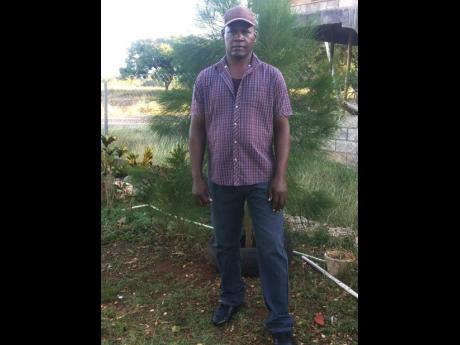Deadly will
• Land dispute blamed for family triple murder • Psychiatrist calls on society to address root causes of violence
An alleged forged will that stoked a simmering dispute between a father and his son over ‘dead leff’ land, and which pitted family members against each other, cast a long shadow over a triple killing that has rocked the Francis clan in Toll Gate,...
An alleged forged will that stoked a simmering dispute between a father and his son over ‘dead leff’ land, and which pitted family members against each other, cast a long shadow over a triple killing that has rocked the Francis clan in Toll Gate, Clarendon.
The multiple-fatality case has again thrust into the spotlight Jamaica’s response to interpersonal conflicts and the often deadly outcomes.
Businessman Evan Francis, 61, and his wife Alicia Francis, 46, were gunned down as they attempted to enter their yard on Duke Street in Toll Gate, Clarendon, after arriving in separate vehicles on the afternoon of November 1.
Only hours before, the lifeless body of Evan’s 39-year-old son Kenrick, a taxi driver, was found on a roadway in Milk River in the parish. He’s believed to have been shot dead earlier the same day.
Though the police have not declared an official motive, sleuths theorise the two cases are linked, with the seeds of the tragic turn of events likely planted four years ago, according to records seen by The Sunday Gleaner last week.
Family patriarch William Francis, Evan’s father, died on March 5, 2018 and following his burial a month later, some of his children and other relatives convened for the reading of his will.
The late retired tractor driver named several beneficiaries, including his grandson Kenrick, whom he gave a portion of the sought-after Duke Street property where Evan had a house, along with other relatives.
The man’s estate was not settled, however, as shortly after, Evan emerged with a will he claimed contained the “true” wishes of his father.
That purported will included members of the family who were not beneficiaries in the first will; while some listed in the first were not to be found in the second, according to a police source and members of the family who declined to be named.
Kenrick was among those not named in the will produced by his father.
The Clarendon police have confirmed that Kenrick filed a complaint with the fraud squad.
The size of the property was reduced years ago after the Government bought a portion for the construction of the May Pen to Williamsfield leg of Highway 2000.
There is a view in the family that with the highway so close to the property, its value would rise significantly.
Evan and one of his brothers occupied different premises on the property.
Kenrick, who started to build on the property, reportedly had to abandon plans and move away to Milk River, as the dispute with his father intensified.
The deep rift divided the family – one side supporting Kenrick and the other defending Evan.
Relatives overseas also reportedly fuelled the dispute.
FAMILY MEETING
The matter dragged on until Sunday, October 31, when Evan called a meeting with his children and other relatives to discuss a “development”, a report said.
Kenrick was not present, as it was said that he was not invited.
His father disclosed at the meeting that he was being sued by Kenrick for an alleged bogus will.
Evan had received a letter from Kenrick’s lawyer asserting that the second will was not valid.
At least one of his children reportedly pointed out that the signature on the will he produced appeared different from that on the first one.
Almost 24 hours after the meeting, Kenrick was found dead.
And within 24 hours after that, his father and stepmother were shot dead.
According to police reports, Evan and his wife drove up separately at their home on Duke Street sometime after 5 p.m. on the afternoon of November 1. Evan exited his vehicle to open the gates, while his wife sat inside her car.
Gunmen approached and shot them multiple times.
The whereabouts of Kenrick’s mother is unclear and the police said they found it “curious” that Evan did not turn up to identify his son.
Kenrick’s post-mortem is scheduled for tomorrow.
Relatives and residents of the community have remained tight-lipped on the triple tragedy and the sordid family dispute.
“I am grieving,” said one of Evan’s children, in declining a Sunday Gleaner interview.
Head of the Clarendon police, Superintendent Carlos Russell, said the land dispute is the likely motive behind the killings.
“This is a dispute between the family about the property … . We have not found the shooters, so we’re doing that investigation. We have some persons interviewing, so we’re hoping to reach somewhere with that,” Russell told The Sunday Gleaner last week.
Several members of the family have given statements to the police.
The Major Investigations Division of the Jamaica Constabulary Force is leading the probe; however, it has declined to comment on the case.
Interpersonal conflicts driving up murder rate
The Francis family tragedy is the latest deadly domestic dispute to hit Clarendon, which is still grappling with the murder of a mother and her four children by a relative in June at their home in Cocoa Piece.
It is also the kind of violence that the police have argued they cannot use hard force to quell, given its more invisible occurrence until manifestations in stabbings and shootings.
Of the 1,360 murders recorded up to November 13, “interpersonal conflicts” account for 16 per cent or 217 killings, Police Commissioner Major General Antony Anderson revealed last week.
Those figures have contributed to the overall seven per cent increase in murders for the period. Gang violence accounted for more than 71 per cent of the homicides.
Up to November 16, Clarendon recorded 86 murders.
“Murders resulting from interpersonal conflicts are often cleared quickly, primarily because the suspects are known. But lives are already lost, families are torn apart, and survivors or witnesses are traumatised,” the police chief said earlier this year.
STOP PLAYING CATCH-UP
Consultant psychiatrist Dr Earl Wright said he was not surprised that almost a fifth of Jamaica’s homicides are linked to domestic disputes, pointing to studies, including one from late psychiatrist Professor Frederick Hickling and clinical psychologist Vanessa Paisley, that more than 40 per cent of the population suffer from personality disorders.
“A significant percentage of the Jamaican population is prone to interpersonal problems and that is developed from early on in life. If you had adverse childhood events, you are more likely to develop problems in relationships later on in life and a significant number of our population will be exposed to adverse childhood events,” Wright told The Sunday Gleaner.
Jamaica has been addressing the “symptoms” and not enough of the root causes, which are parenting and early childhood development, Wright argued.
“Most of our personalities are developed between zero and five ... . If a child is exposed to violence, if a child is exposed to problems in relationships, that is going to be biasing the brain, so how they respond later in life will be adverse,” he noted.
Wright said it was important to provide security and other basic services as part of societal needs, but there ought to be more aggressive responses to “correct the root problem” and avoid “playing catch-up”.
“We spend a lot of money on the later years but not enough focus on the early years; the zero to three and three to five. What is a must: there needs to be emphasis on parenting, early childhood development and there must be a return to values and attitudes, civics in the school curricula … . People need to be taught effective parenting.”
The education ministry has now introduced the teaching of character education in the public school system.
Civics – which educates students about their rights, duties, and responsibilities as citizens, the structure and functions of government, the significance of national symbols and emblems, among other things – was slated for reintroduction in schools in 2012. But up to June this year, the Jamaica Teachers’ Association issued another call for re-implementation, saying the removal was a grave and fundamental error.




